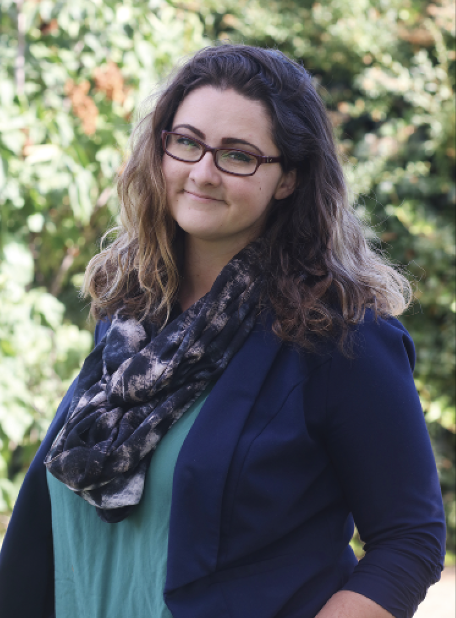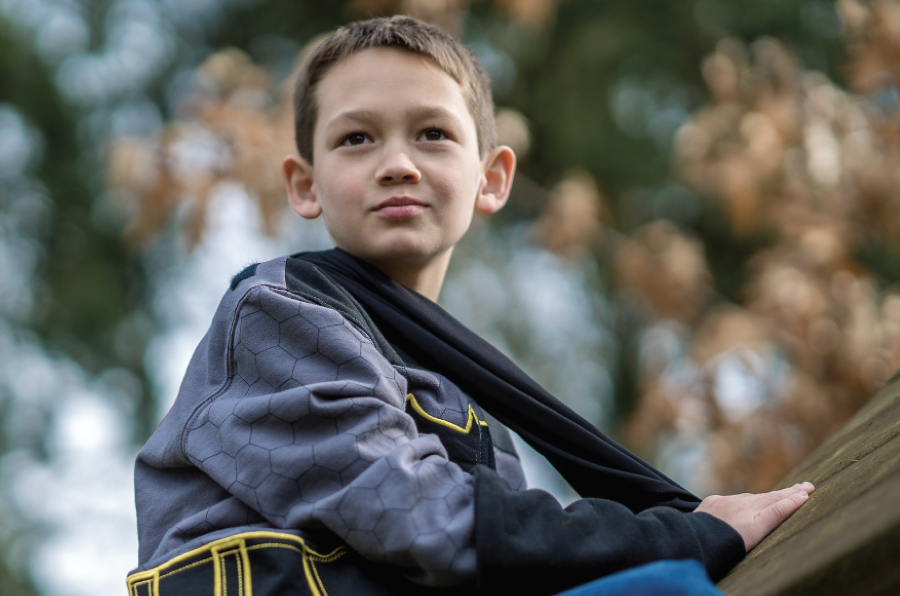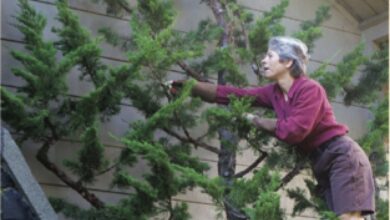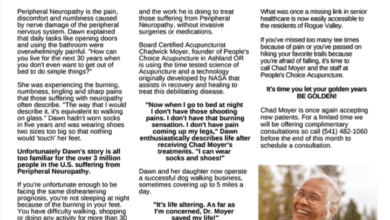Serina Pori – Family Solutions Oregon
 In today’s interview, I speak with Serina Pori, Development Director of Family Solutions. Family Solutions is a local nonprofit organization dedicated to serving the mental health needs of children, teens, adults, and families in Southern Oregon.
In today’s interview, I speak with Serina Pori, Development Director of Family Solutions. Family Solutions is a local nonprofit organization dedicated to serving the mental health needs of children, teens, adults, and families in Southern Oregon.
Hi Serina, thanks so much for talking with us today. To begin with, will you please introduce us to your organization and tell us a little bit about your history and work here in Southern Oregon?
Thank you so much for the opportunity! Family Solutions is a local nonprofit which has been serving the mental health needs of Rogue Valley since 1971 under a few different names [formerly Family Friends and Southern Oregon Child Study & Treatment Center (SOCSTC)]. We work with all ages but specialize in serving the unique needs of children and their families. Our mission is to create opportunities for healing and often that means taking the holistic approach of supporting the child within the family and the family within the community. We work primarily with low-income families and provide our services at no cost to the individual or family.
I am entering my 3rd year with the organization and have been thrilled to be able to support my community through my work. Connecting community and ensuring no child feels alone while navigating trauma has always been in my heart. Overcoming homelessness as a teen and discovering my “found family” in the community has been a significant driving force in my life. I feel that channeling my skills and experience into supporting others is what I was meant to do. I’m so glad to be able to see that dream realized through my work at Family Solutions and through our partners in the community.
Serina, can you go into more depth about specifically what your organization does in our community?
On the surface, Family Solutions provides a myriad of mental health programs to serve the various needs in Southern Oregon. Some of our programs include outpatient therapy for all ages, school-based counseling, psychiatric day-treatment schools, community-based family support through the Dept. of Human Services (DHS), residential programs for teen girls in foster care, and therapeutic (proctor) foster care through Foster+.
To give a better idea of what that actually means, I’ll tell you about Tyler*. Tyler had been through 30 placements in the foster care system all over Oregon in the course of a single year. The trauma he had experienced which brought him into the foster care system is frankly unspeakable. When children are brought into our programs their stories and experiences are beyond the pale. Things no child, no person, should ever have to experience. It is utterly heartbreaking. The families that Tyler was matched with were understandably ill-equipped to address the trauma he had experienced and with each transition, the heartbreak compounded on itself. Tyler’s anger, frustration, and heartbreak manifested itself into a metaphorical storm inside him which exploded out in the form of physical and verbal violence.
It took several months of working with our staff in our residential program for Tyler to begin to explore “the storm inside him” which came out in dramatic ways whenever Tyler needed to express strong feelings or overcome daily challenges. Together we helped him calm that storm, to use his words so he felt heard, and to process his emotions in a healthy way. It took time, but it was beautiful to witness Tyler become a leader among his peers, and watch him help others to calm their own inner storms. His new skills allowed him to transition to one of our therapeutic foster families in the community. It’s not perfect, but Tyler continues to work on his behavioral goals and when “stormy” days come he knows he is not alone and there is hope for a brighter tomorrow.
*Tyler’s name has been changed to protect his identity and his privacy.
How do individuals begin to work with your organization? Please walk us through the process?
Families begin to work with us in many ways, depending on their needs and which program will be the best fit to address those needs. Medford and Phoenix/Talent School District students and families can self-refer for free access to mental health support or school staff may recommend our services for them as well. Those who would like access to outpatient therapy can also self-refer, or they may also be referred by their primary care provider or coordinated care organization (CCO). For students to gain access to their therapeutic schools they must receive a referral from their CCO or from their school district. Referrals are also required for our residential programs and therapeutic foster care, and typically come through DHS. The community is welcome to connect with us if they have any specific questions or would like more information about any of our programs.
If you are not in the schools right now, how are you working to best support children in our community?
Making the transition to virtual therapeutic support has not been easy, but our staff have worked tirelessly to ensure every student is still able to access the support they need. The key to making this transition successful has been our partnerships with the schools and the teachers.
Teachers not only have regular contact with the students, but they also are able to identify when a student has a change in behavior or demeanor that may indicate a need for additional mental health support.
When a student or family connects with us or is connected to us by school staff we are able to provide support over the phone, through Zoom video calls, or through physically distant therapy sessions. We have spent the summer training our staff in the best practices for bridging the gaps within this year’s new struggles and have seen success in our efforts. We recognize there are significant added stressors across the board for our students, families, and schools, so we are working harder than ever to ensure everyone is supported and connected as much as possible.
If you know of a student, family, or individual who may benefit from emotional wellness support, please encourage them to connect with our new Emotional Wellness Hotline 541-842-3643, available Monday-Friday from 8AM-4PM. This resource is free for anyone who has been impacted by the recent fires. Spanish-speaking families may access a dedicated line at 541-842-3644, Monday-Friday from 10AM-2PM.
How do you help parents and families to be able to provide safe therapeutic experiences at home?
Across all of our programs we seek to keep the individual at the center of their care. This means recognizing they are an expert in their own experiences, honoring their values and beliefs, and working together to find positive solutions. It also means recognizing they exist within a matrix of factors which may be helpful or hindering in their journey toward mental wellness. We seek to support individuals within the family and the family within the community in a holistic approach toward achieving mental health and behavioral goals. We work closely with parents/guardians to provide them with therapeutic skills and training which can be used at home; as well as connecting them to additional resources in the community for things like food, housing, and transportation. By building a network of support we are able to foster resilience in the individual and the family.
In witness to the current crisis in Southern Oregon, what is your biggest concern right now?
Our biggest concern is people falling through the cracks in terms of access to mental health support. The services we provide are more important than ever and we want to ensure everyone is aware of the services we provide. If not for themselves then for someone they know who may benefit from a little extra help right now. I think we are all hurting in some way, whether it’s for ourselves, for our loved ones, or for the community as a whole. We want to help, we are here to help. If we aren’t a perfect fit for whatever reason we can still connect to other resources in the community to make sure Southern Oregon is taken care of. We are going to get through these difficult times, and we’re going to do it by working together.
How do we create more sustainable and holistic approaches to mental health and wellness within families?
Normalizing access to mental health is a great first step, but addressing trauma as early as possible or preventing trauma before it happens is the most sustainable approach to mental health. This is why we serve children as young as 2 and 3. Even if children that young do not have the words to explain their feelings, they can still be supported and we can normalize how they can approach adults to express themselves in a healthy way and have their needs met. The holistic approach is to identify and address all the various factors which may impact a person’s mental health. For example, sometimes that may mean access to stable housing/food/transportation, as well as offering support to the family to cultivate a positive home environment.
What are some of the struggles you are dealing with on a daily basis? How do you help children to be the happy healthy kids they deserve to be?
Jessica’s* story really highlights the daily struggles of many of our youth and illustrates the results we work together to achieve. We were connected to Jessica when she was in middle school through a teacher referral. Jessica was lashing out at school staff and struggling to complete her work at home and in the classroom. Her teacher was concerned because Jessica was continually spending more time out of the classroom in detention and suspension than in the classroom learning because of her verbally violent outbursts, at full volume and overflowing with profanity. When she connected with our counseling staff, at first she wasn’t receptive. She didn’t trust us and she didn’t think we could help. After a few sessions she started to open up and, not-so-surprisingly, we discovered she was a great communicator! She had been communicating with her teacher and the school staff this whole time but because of her tone, volume, and language she wasn’t being heard by those she was communicating with. We were able to address her mental and emotional struggles and connect her family to regular group sessions of outpatient therapy. We explored skills which would help her to get her emotional needs met by helping Jessica to express herself in a healthy way. She began the healing process along with her family and they were stronger because of it. To be honest, Jessica still uses colorful language sometimes, but it’s not out of anger anymore. She’s proud of how she is such a strong communicator and we look forward to watching her grow that skill as she moves through high school and the world beyond.
*Jessica’s name has been changed to protect her identity and her privacy.
What other organizations are you working with in the community?
We work closely with the Medford and Phoenix/Talent School Districts, Options for Southern Oregon, the Oregon Department of Human Services, Foster+, AllCare Health, and Jackson Care Connect.
What has 2020 been like and what do you anticipate now with the fire in southern Oregon?
This year has been absolutely unprecedented for our organization. We have never been more proud of our staff and their willingness and flexibility to learn completely new ways of operating to keep the people we serve and our programs safe. We have completed extraordinary amounts of training, we opened a new residential program for teen girls in Grants Pass, we have overhauled all of our sanitation and safety protocols, and we are now serving as many people as possible who have been impacted by the fires. We are helping individuals and families navigate resources and are doing everything in our power to serve our community. I would like to mention again the Rogue Valley Emotional Wellness Hotline which I mentioned before, 541-842-3643.
Where does the funding for your organization come from?
We are primarily funded through our contracts and partnerships with the school districts, Jackson Care Connect, AllCare Health, Options for Southern Oregon, the Department of Human Services, and Foster+. We also receive generous support from the Raymond Family Foundation, The Rite Aid Foundation, and The Elizabeth C. Pease Memorial Fund. We also team up with Kairos and Options for Southern Oregon to host the Rogue Winterfest in Grants Pass, an annual multi-day fundraising event which is going virtual this year! And last but not least, we receive financial support from generous individuals in our community who help us to meet the ongoing needs of each of our programs and ensure everyone has access to the mental health support they need.
Please introduce us to your team.
We have over 100 employees from Ashland to Grants Pass serving our community. While most are best known through their one-on-one connections in the community, I am the face the community typically sees. Our executive staff consists of our fearless leader and Executive Director Thomas Johnson, and our powerhouse Chief Operating Officer Dorothy Provencio. Both work tirelessly to make the connections we need to get even more connected to the community!
What initiatives are you currently working on?
We are currently working on connecting with those impacted by the Southern Oregon fires as well as building up our new residential program in Grants Pass, Willow House, for teen girls. We are also gearing up for the Rogue Winterfest fundraiser which is going virtual this year!
Tell us about the new virtual space you are working in.
We are regularly connecting with the community via Zoom, but are also providing telephonic support and physically distant options as well depending on which option the individual is most comfortable with.
Can you tell us about your therapeutic foster care program?
Foster Plus, Family Solutions’ therapeutic or proctor foster care is a step up from traditional foster care. We are often serving children who have more emotional or behavioral challenges as a result of trauma they have experienced. This means it’s important for families to have extra training, skills, and support to address that trauma and provide a therapeutic environment for the child in their care. Our Foster Plus families have direct access to our staff 24 hours per day, 365 days per year. To become certified, families undergo several months of weekly trainings to ensure they are confident and comfortable meeting the needs of the child. We meet with the family and the child on a weekly or daily basis (depending on the need) to ensure the child and the family are both thriving together. Our families also receive relief care support every month to encourage parents to practice self-care and give respite to the child as well. Foster+ parents, CASA’s, DHS caseworkers, and our staff all come together regularly to ensure each participant is working in the best interest of the child and behavioral goals are being met.
How can we as a community help to support your organization?
Your gift of financial support helps us to continue to be flexible for the growing needs in our community! No donation is too small and each gift is extremely appreciated.
If the needs of our foster children are pulling at your heart, please connect with us! We have part-time and full-time fostering options available and would love to provide you with more information.
Connect to our mental health services or pass along this article to a loved one who may be able to benefit from the programs we offer. We want to help and we need your help to make it happen!
How does the work you do change lives?
We change lives by changing the trajectory of the life of a child. When Tyler opened up to us he said, “what if no one can ever love me?” With his new foster family, he knows not only that he is worthy of love, but that he is surrounded by unconditional love. Jessica thought she was going to drop out of school, but now she is in high school making plans for after she graduates! Studies on resiliency often point to one strong, unwavering, trusted adult in the life of a child. That is what makes the difference between resilience and a life of struggle. We are that person for so many children. We empower our community to be that person for others. We do this, but we don’t do it alone! We are so blessed by our community who stands by our side and says these children matter and their futures matter. Each life we touch is shown they are welcome and appreciated as a fully participating member of our community. We are stronger and we are better because they are a part of it. It’s amazing to imagine a world where each and every person felt that way.
Finally, where can our readers learn more and do you have any last thoughts or comments you wish to share?
If you would like to stay connected with updates to mental health in our community, Follow us on Facebook @FamilySolutionsOregon, sign up for our newsletter by sending me an email at spori@solutionsOR.org, or check our our website at www.familysolutionsoregon.org
A comment I would like to make is that I have heard several people saying they do not want to take support from the community when there is someone else out there who may need it more. To those who are feeling this way, please know you are helping the community to heal by taking support if it would be helpful to you. Those who were not directly impacted by the fire have their hearts breaking over the devastation they see all around us. They are seeing that devastation and doing what Southern Oregon does best, asking what they can do to help. When you graciously accept their desire to heal our community, you are helping them to become whole again too. We are going to be alright. We are going to get through this together. I don’t know you, but I love you. I wish you all the best in the world and if there is any way I can help, please feel free to contact me.
For my last comment, I would like to speak to our helpers out there! If you are a helper in our community, thank you so much for all you are doing to help our community heal, but please remember you cannot pour from an empty cup. Please take care of yourself. Fill your cup in whatever way you can. Maybe it’s taking a calm moment for yourself where you are practicing deep belly breaths, or knowing when to say “I am happy to help, can I get back to you when I am ready?” You will be able to do so much more if you allow yourself to take time when you need it! I don’t know you but I love you and you are amazing!
Learn More:
Family Solutions
201 W. Main St., STE 4B,
Medford, OR 97501
www.familysolutionsoregon.org
541-414-1720





